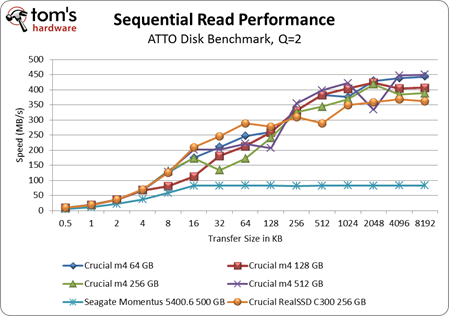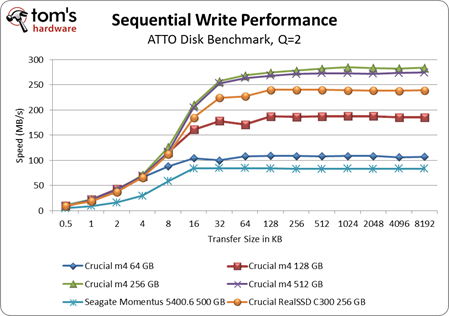Crucial's m4 SSD Tested At 64, 128, 256, And 512 GB
Sequential Performance Vs. Transfer Size
We just looked at 128 KB sequential performance in Iometer, but that only shows the performance of each drive at a queue depth of one. In the real world, there are situations where you'll see higher queue depths, even with a performance-oriented SSD. That's why it's important to also factor in those higher queue depths into our performance analysis.
This time, we're using ATTO to test the sequential reads/writes over 2 GB using a queue depth of two. Why only a queue depth of two? Even when you're pushing the envelope, operations complete so much faster on an SSD that queue depths higher than two or three are far less common on an average desktop.
The other reason to use ATTO is its ability to easily test different transfer sizes. While 128 KB is the standard block size for measuring sequential performance, there are situations where you're going to deal with smaller or larger transfer sizes. Block sizes are often larger than 1 MB. On the lower end of the spectrum, DLLs and file dependencies are often 4 KB or less.
As we look at a slightly higher queue depth, larger-capacity SSDs no longer offer superior 128 KB performance to lower capacity SSDs in sequential reads. The 512 GB m4 achieves about 210 MB/s, but the 64 GB m4 hits somewhere close to 260 MB/s.
Sequential write performance is a more clear-cut case where more capacity translates into additional performance. Here we see the 512 and 256 GB m4s at the top of their game, achieving as much as 275 MB/s. The RealSSD C300 falls slightly behind at 240 MB/s, while the 128 GB m4 drops to about 190 MB/s.
Armed with half of the capacity, the 64 GB model performs noticeably worse, its sequential writes topping out at about 100 MB/s. However, that's a lot better than what we saw from Iometer with a queue depth of one. Now, we're seeing better numbers from the SSD than Seagate's 500 GB Momentus 5400.6.
Get Tom's Hardware's best news and in-depth reviews, straight to your inbox.
Current page: Sequential Performance Vs. Transfer Size
Prev Page 128 KB Sequential Performance Next Page PCMark 7: Storage Suite-
wintermint I've been recommending the Crucial m4 128gb to people, and after seeing this.. I'm glad I did :]Reply -
sceen311 it'd be nice if they threw a 7200 rpm hardrive on the bench... We don't all have laptops ya know.Reply -
compton I'm glad this was done. It's rare that you get the chance to stack all the capacity points up (as in never). I bought an Intel 510 120GB and a M4 64GB and my own testing showed that you'd never know the difference besides the capacity (in day to day use, besides lower max write MB/S). I kinda like keeping my system drive to a bare minimum -- just Win7 no swap or hibernate, Office, a few other apps, and then I keep my Steam folder on a separate drive. Simple. I will say that if you are building a new system, cut whatever you have to in order to fit at least a 64GB SSD -- the M4 is excellent at any capacity. I'd rather have to go down to an i3 from a 2500k than from a SSD to a HDD. I get tired of people saying "it's not worth it" and "they're not much faster than a 7200rpm". Those people must be doing it wrong.Reply -
beenthere Now if they could only make these SSDs reliable, we could all enjoy some performance improvement. Intel, Micron, OCZ and Corsair to name a few have all had reliability/compatibility/firmware issues of some sort resulting in loss of data, which for me is simply unacceptable.Reply -
Last month I got a 64GB for my laptop and a 128GB m4 for my desktop. So far no issues, and the speed is great. Glad I got the 128GB and not the 256GB.Reply
-
PCMark 7 Storage tests are just pathetic, they have messed some of them up on purpose it seems just to shrink the difference between systems containing SSD and the ones containing HDD only, useless bench from start to "finish"...Reply
-
mroanhaus I picked up the 64 GB M4 two weeks ago on Newegg for under $90. I am so glad I bought it, the thing makes boot times lightning fast. I have Win7 64-bit, Photoshop, 3DS Max, Google Chrome, and a few little monitoring and Bitcoin mining apps on there and I STILL have 21 GB to spare. Don't buy the 128 GB unless you really need it, throwing Steam and other massive apps will be much better suited on a secondary HDD. SSDs are simply amazing and well worth the money spent, even if you're a cheapass like me they're still affordable. The time saved from having to wait around while booting your computer makes SSDs worth the money imoReply -
burnley14 ReplySee how they all hover pretty close to the same price per gigabyte, while sequential write and random write performance trend upward? Those are the spoils available to folks willing to spend more on higher capacities.
This is true, but in 6 months when the whole lineup is outdated and the next generation of drives blows these ones away, those that spent more are going to have spent the extra money without much purpose. -
cknobman burnley14This is true, but in 6 months when the whole lineup is outdated and the next generation of drives blows these ones away, those that spent more are going to have spent the extra money without much purpose.Reply
Well going by your logic why should anyone ever spend money on anything in technology??? Guess its always a waste huh?
Failed logic.

